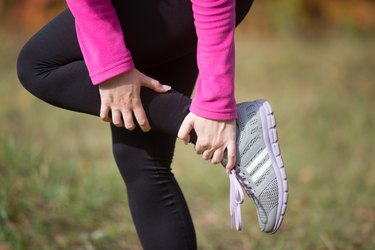
If you have high cholesterol, it can lead to a number of health complications. As cholesterol begins to build up in the blood and accumulate in your arteries and veins, one of the consequences over time can be tingling and numbness in the body's limbs.
Luckily, there are steps that you can take to prevent these complications.
Video of the Day
Video of the Day
Cholesterol and Numbness
According to Kunal Karmali, MD, a cardiologist with Northwestern Medicine in Chicago, having high blood cholesterol is not directly linked to having feelings of tingling or numbness in your arms or legs. However, it can be a secondary effect of high cholesterol over time.
"The challenge is that high cholesterol is often asymptomatic," says Dr. Karmali. "People only feel symptoms when they have blockages in those arteries. I think tingling, particularly in the legs, or achiness, can sometimes be symptoms of leg arteries having blockages. Those blockages could have formed because of high levels of cholesterol, and so that brings us back to the importance of prevention."
While tingling and numbness, medically known as neuropathy, are not direct symptoms of high cholesterol, the Cleveland Clinic notes that it can be a risk factor for the condition. Typically, neuropathy is more likely to occur if an individual has all the symptoms of metabolic syndrome — not only high cholesterol, but also high blood pressure, diabetes and obesity. In fact, about 60 to 70 percent of people with diabetes may experience some type of tingling and numbness.
Other Links Between Cholesterol and Numbness
If high cholesterol persists for a long period of time, it can contribute to tingling and numbness in the limbs in other ways, as well, notes the American College of Foot and Ankle Surgeons. Over time, high cholesterol leads to plaque, which is made up of cholesterol and other materials, accumulating in your blood vessel walls. These narrow areas and blockages can prevent oxygen-rich blood from reaching the arms and feet, and tingling and numbness are the result.
As these blockages worsen, they are eventually classified as peripheral arterial disease (PAD). Other signs and symptoms of the disease include leg pain and cramping, sores on the legs or feet that won't heal, cold legs or feet or a change in color in the legs, feet or toenails.
"If you have these symptoms, they need to be evaluated by a physician to determine the cause and if it's related to narrowed or blocked arteries," says Khurram Nasir, MD, director of the Preventive Cardiology Clinic at the Houston Methodist DeBakey Heart & Vascular Center. "Cholesterol-lowering medications have been established to reduce the risk of having a heart attack and stroke in these patients."
According to the Mayo Clinic, one final thing worth noting about cholesterol and numbness and tingling is that a common cholesterol-lowering medication, Liptruzet (an atorvastatin and ezetimibe combination), can cause these symptoms as potential side effects.
What You Can Do About It
If you do experience any numbness and tingling in your arms, legs or elsewhere in your body, Dr. Karmali advises that you seek medical attention as soon as possible.
"Anyone experiencing tingling in their limbs should mention them to their primary care doctor to figure out what it actually is," he says. "You want to make sure it's not a nerve issue or something that's non-vascular related at all. That's hard to rule out without seeing a doctor. You need to determine if it's an artery-related problem or a non-artery-related problem."
- Kunal Karmali, MD, cardiologist, Northwestern Medicine, Chicago
- Cleveland Clinic: "Neuropathy (Peripheral Neuropathy)"
- American College of Foot and Ankle Surgeons: "Peripheral Arterial Disease (PAD)"
- Khurram Nasir, MD, director, Preventive Cardiology Clinic, Houston Methodist DeBakey Heart & Vascular Center
- Mayo Clinic: "Atorvastatin and Ezetimibe (Oral Route)"
Is this an emergency? If you are experiencing serious medical symptoms, please see the National Library of Medicine’s list of signs you need emergency medical attention or call 911.